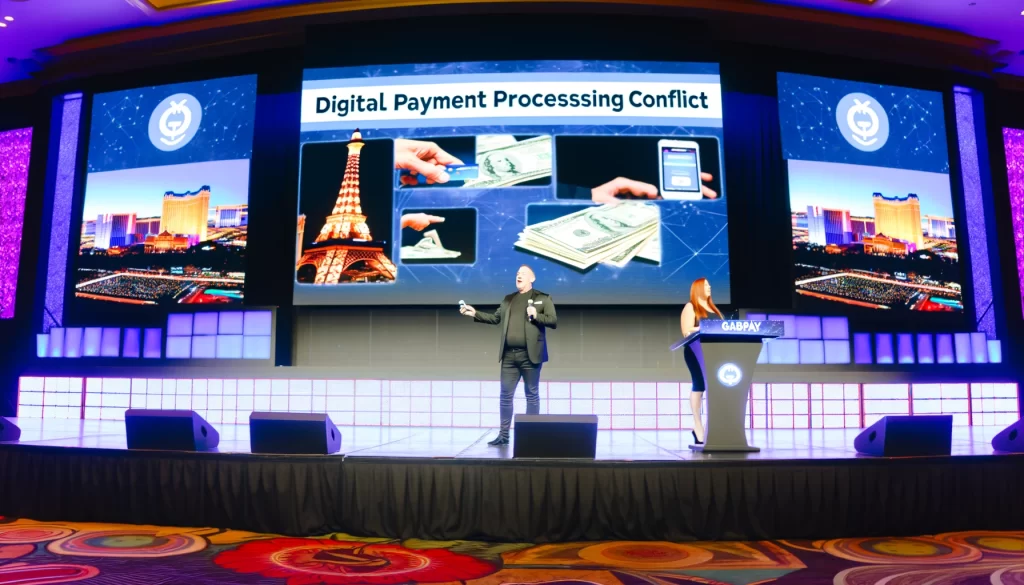In March, a group of people known for their strong opinions on various topics came together in Las Vegas. They were there to talk about creating a future where no one could silence or “cancel” them. This gathering was called the RePlatform conference.
But there was a hitch. Just a few weeks before the conference was supposed to start, the organizers ran into a big problem. The company handling the money from their ticket sales, Stripe, decided to freeze their account. This meant the organizers couldn’t access most of their money. Dan Eddy, one of the speakers at the conference, explained from the stage in Vegas, “Stripe just said, well, we’re going to hold 70%. And what they do is they say, we’ll give it back to you after the show.” Luckily, Eddy works for an alternative payment company, GabPay, which stepped in to help without hesitation. GabPay is connected to Gab, a social media platform. Eddy told the event organizers, “We’ll process for you. No problems, no questions asked. We’ll do it.”
This situation highlights the reality in which many groups, including those who are skeptical of vaccinations and election results, are forced to find new ways to operate financially outside the mainstream systems.
At the RePlatform conference, the audience was made up of people with various views, including those against vaccines, supporters of former President Donald Trump, and Christian conservatives. Most of them were entrepreneurs looking to create what they call the “freedom economy.” Chris Widener, the event’s emcee, captured the mood by saying, “We are here together because we are people who have either been canceled or we really understand what is going on in America today as it relates to cancelization.”
The event featured many talks criticizing mainstream culture and media, while also promoting businesses that align with their views. For example, Megan Greene from a web-hosting company called Patmos, encouraged everyone to support businesses that share their values, saying, “Leave Amazon, leave GoDaddy, leave all these woke corporations behind and start spending money with organizations that have your best interests in mind.”
This push towards creating a separate “freedom economy” reflects a wider trend. Some reports suggest that there are at least 80,000 small businesses in the U.S. that could be part of this economy, offering everything from coffee to dating services.
The idea of creating a parallel society isn’t new. Amarnath Amarasingam, a professor of religion at Queen’s University in Ontario, points out that some religious communities have sought to build their own separate spaces for a long time. This desire has grown among different groups, especially in response to recent events like the COVID-19 pandemic, election controversies, and increased visibility of transgender people.
Amarasingam explains, “They feel like they’re on the outs. They believe that the governments are against them, intellectuals are against them, that science is moving in the opposite direction, that science education is moving in the opposite direction. So they just see a lot of trends that they feel are against traditional Christian values, family values.”

The incident involving the RePlatform conference and Stripe’s refusal to make its funds available to it is an example of “debanking,” which happens when banks or payment services close or freeze accounts. While some people say this is because of political reasons, it’s hard to tell why it really happens since the reasons aren’t usually shared, according to Jessica Davis from Insight Threat Intelligence. Stripe didn’t share why they froze the conference’s account, saying they wanted to protect customer privacy. Sometimes, accounts are closed for simple reasons, like not using the account correctly. However, Davis noted that some people see being cut off by these services as a way to gain attention or sympathy.
On the other hand, there have been big instances where groups or individuals lost access to these services after being involved in violent actions. Megan Squire from the Southern Poverty Law Center said that there are often big reactions like cutting off services after violent events like the Charlottesville rally in 2017 or the Capitol riot on January 6, 2021. She’s seen how some groups have tried to create their own services to avoid these bans, like making their own payment platforms or social media sites.
GabPay is one of these attempts, linked to Gab, a social media platform known for allowing speech that other platforms don’t. Gab was started in 2016 by Andrew Torba as an alternative for those who felt mainstream social media sites were against conservative views. Gab doesn’t allow porn but is very open about letting all other kinds of speech happen, even if it’s considered hate speech by others.
Gab received a lot of attention when a man who used Gab attacked a synagogue in Pittsburgh in 2018, killing 11 people. Despite this, Torba, Gab’s founder, has made statements that don’t welcome Jewish people in his movement, while also saying he doesn’t hate Jews.
Torba once mentioned on his podcast that Gab users made him aware of certain issues and used phrases like “Jewish Question” and “Zionist Occupied Government,” terms associated with Nazi ideology. When asked about this, Torba responded simply, “Christ is King,” a phrase that can be seen as a neutral expression of Christian faith but has also been adopted by far-right groups.
At the conference, Dan Eddy from GabPay defended Gab and Torba’s remarks as something that should be protected by the First Amendment and that is for Christian values. He contended that regardless of whether people agree with these views, they support the idea of free speech.
Various organizations at the conference expressed their opinions about working with Gab and GabPay. Eric Ohlhausen from Old Glory Bank said his bank aims not to censor and welcomes all customers. Ashton Cohen from PragerU commented on accusations of antisemitism, sharing a personal story to illustrate his point that such accusations should be directed rather to the Left. Steve Kirsch, an organizer of the RePlatform conference and known for his anti-vaccine stance, emphasized his desire to reach a wide audience and stated he does not support racism.
The overall message at the conference was clear: as long as what you’re doing is legal, there’s a willingness to work together, regardless of any potential controversies.
This article is based on the following article:

Background Information
Understanding these concepts will help readers better comprehend the complexities involved in discussions about freedom of speech, social media, financial services, and the efforts by some groups to create alternative networks and economies.
1. Freedom of Speech and the First Amendment:
- The First Amendment to the United States Constitution protects several basic freedoms, including freedom of speech, freedom of the press, the right to assemble, and the right to petition the government. It prevents the government from making laws that unfairly restrict these freedoms. However, the First Amendment does not prevent private companies, like social media platforms, from regulating speech on their services.
2. Social Media, Censorship, and “Deplatforming”:
- Social media platforms have rules about what can and cannot be posted, designed to prevent harm and harassment. However, some claim that these rules censor certain viewpoints or constitute “deplatforming,” which is when someone is removed from a platform to limit their reach. This often leads to discussions about the balance between free speech and preventing hate speech or misinformation.
3. “Debanking”:
- Similar to deplatforming, “debanking” occurs when financial services refuse to do business with certain customers. This can include closing accounts or refusing transactions. While sometimes seen as a way to prevent harm (for example, stopping services to illegal businesses), it raises concerns about fairness and the ability of legal businesses to operate.
4. Alternative Platforms and the “Freedom Economy”:
- In response to censorship and debanking, some groups seek to create or use alternative platforms that are more permissive of their views. This has led to the development of a “freedom economy,” where businesses and platforms aim to cater to those who feel marginalized by mainstream services.
5. Gab and GabPay:
- Gab is a social media platform that positions itself as a free speech alternative to more mainstream platforms. It has been controversial due to its permissive stance on what many consider hate speech. GabPay, associated with Gab, is a payment processing service designed to serve those who may have been debanked by more traditional services.
6. Anti-Semitism and Hate Speech:
- Anti-Semitism is prejudice, hatred of, or discrimination against Jews. The term “Jewish Question” and references to “Zionist Occupied Government” are historically associated with anti-Semitic and Nazi ideologies. Hate speech includes speech that attacks or demeans a group based on attributes such as race, religion, ethnic origin, sexual orientation, disability, or gender.
7. Extremism and Violence:
- The article mentions instances where extreme views have led to violence, such as the Unite the Right rally in Charlottesville and the attack on a synagogue in Pittsburgh. These events have spurred discussions on the responsibility of platforms in monitoring and controlling hate speech and extremism.
8. Legal vs. Social Consequences:
- While the First Amendment protects freedom of speech from government censorship, companies and individuals still face social consequences for their actions and speech. Businesses and platforms often have to navigate the complex terrain of supporting free speech while also addressing the social impact of harmful or hateful speech.

Debate/Essay Questions
- Is “deplatforming” a necessary tool for social media companies to maintain community standards, or does it unjustly restrict freedom of speech?
- Does the creation of alternative platforms and payment processors for those banned from mainstream services promote freedom of speech, or does it facilitate harmful discourse?
- How should society balance the protection of free speech with the need to prevent hate speech and violence?
- Are accusations of bias against conservative voices on mainstream social media platforms justified, or are they a misinterpretation of efforts to enforce community standards?
- Is the concept of a free speech absolutist platform feasible, or are some forms of regulation necessary?
Please subscribe to Insight Fortnight, our biweekly newsletter!
